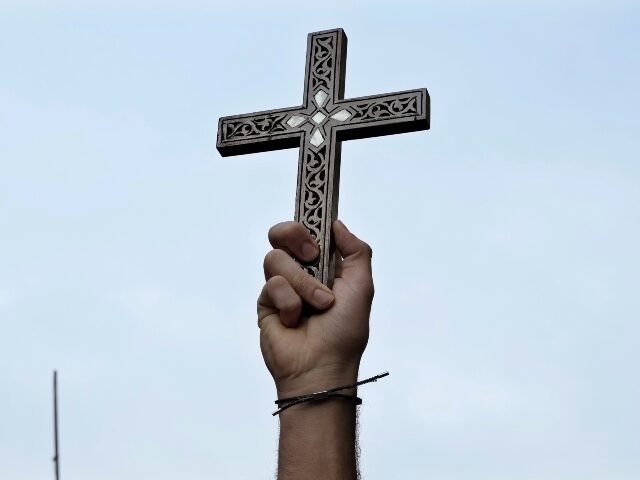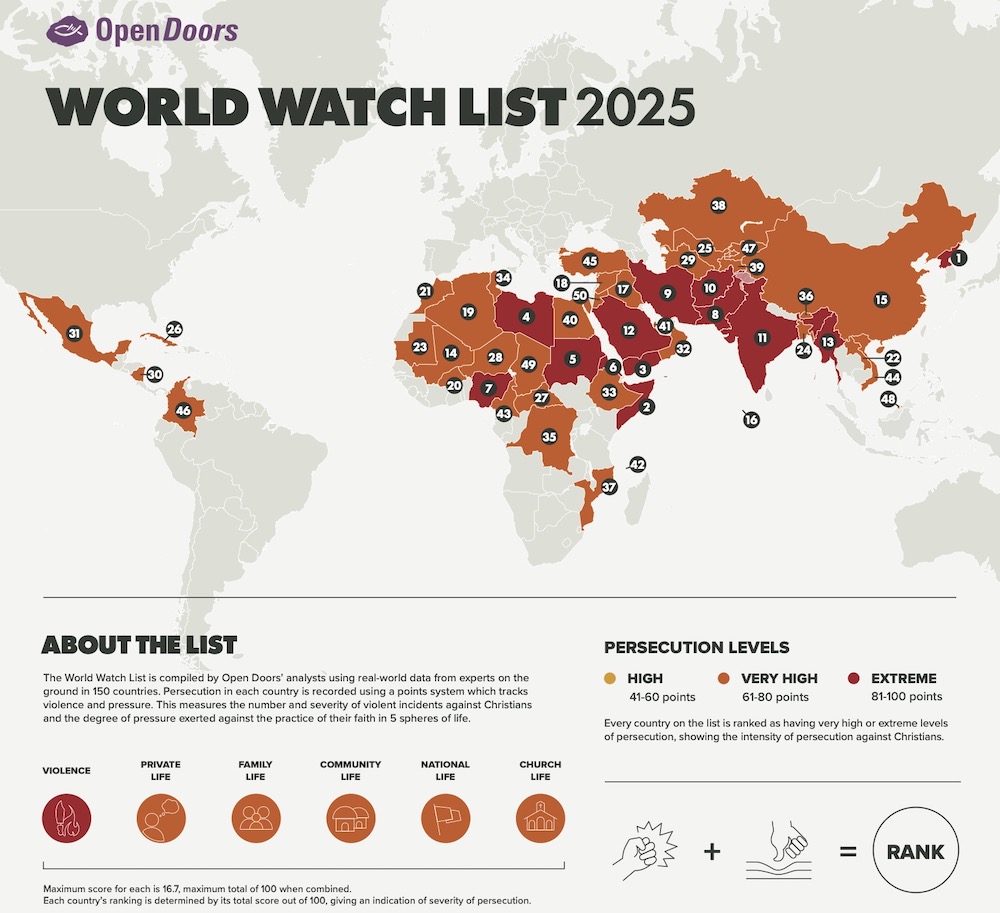The Christian aid organization Open Doors published its annual World Watch List – a ranking of the most dangerous places in the world to practice the Christian faith – on Wednesday, which found that 380 million Christians around the world face severe persecution.
Christian persecution – which Open Doors defines as “any hostile action toward a person or community motivated by their identification with the person of Jesus Christ” – is particularly prevalent in countries with widespread Islamist terrorism or run by communist regimes. Of the top ten countries on the World Watch List, Islamic radicalism is the driver of persecution in eight of them, while the other two, North Korea and Eritrea, are under the yoke of communist regimes.
Of the 380 million Christians facing persecution, in many cases including deadly attacks, 310 million of them are in the top ten nations on the list. Half of these countries are in Africa and three are in the Middle East. Afghanistan is in South Asia; North Korea is an outlier in the Far East region, though bordering the number 15 country on the list, its longtime patron China.
The number of Christians facing violence, displacement, arrest, sexual violence, or other persecution around the world has steadily increased throughout the 2020s. This year’s tally is 20 million more Christians than the total Open Doors identified in the 2022 edition of its study. In 2020, Open Doors estimated that 260 million Christians faced “high levels of persecution.”
The 2025 edition of the World Watch List covers the events of 2024 – which included a rapid increase in radical Islamic terrorism in the African Sahel region, the spread of Chinese influence in several top repressor countries, and the seizure of power in Syria by the al-Qaeda affiliate Hayat Tahrir al-Sham (HTS).
North Korea has been the most dangerous country in the world to practice Christianity on the Open Doors list 23 times since the organization began publishing its annual study in 1991. It has taken the top title in most years of the past decade with the notable exception being the 2022 list – which covers the events of 2021, when the Taliban seized power in Afghanistan. The country is run by a totalitarian communist regime in which citizens are forced to worship the ruling Kim family as gods.
“If your Christian faith is discovered in North Korea, you will either be immediately executed or deported to a horrendous labor camp that few survive,” Open Doors detailed. “The Kim regime relies on tightly controlling people’s behavior and beliefs. In early 2024, they announced stricter regulations against outside influences. It has been reported that about 30 teenagers were executed just for watching a South Korean drama last year.”
Despite this, Open Doors estimates that as many as 400,000 people persist in worshipping Jesus in North Korea.
Africa has surfaced as a major focal point in the fight against religious intolerance.
“According to Open Doors research, over 90% of Christians killed for their faith last year were in sub-Saharan Africa, and 3,100 believers were killed in Nigeria alone,” the organization noted, adding that many of the countries facing the most intense persecution are also home to large Christian populations.
“Nigeria, for example, has the biggest church auditoriums in the world. But that is in the south,” Open Doors observed. “In the north (and increasingly, the central) regions, Christians are in a minority, and radical Islamic groups, like Boko Haram, and Fulani militants can create havoc.”
Almost half, about 46 percent, of Nigeria is believed to be Christian.
The Sahel region, where several governments have fallen to sudden military coups under pressure from Islamist terrorists, has also seen an increase in Christian persecution. Chad appeared on the World Watch List this year for the first time, and countries such as Burkina Faso and Mali have become focal points of jihadist attacks on Christians.
In several Muslim countries on the persecution list, including number two Somalia, persecution takes the form not just of state oppression or terrorist violence but violence and isolation by Muslim families against Christian converts.
“Even at home, any suspicion you have come to faith in Christ can result in house arrest, forced marriage or threats to your life from your own family,” Open Doors observed on Somalia.
An outlier in Africa is Eritrea, where communism, rather than Islamism, is responsible for top-down repression of Christianity. In 2024, Open Doors noted, “government security forces have conducted house-to-house raids, sending hundreds of Christians to the notorious, inhumane prisons.”
“Eritrea is often called the ‘North Korea of Africa’ – phone calls and internet usage are heavily monitored, and Christians suffer the most,” it added.
Eritrea is run by a one-party Marxist dictatorship under the People’s Front for Democracy and Justice (PFDJ) party. The country works closely with communist China, which has helped it expand its repressive technology and surveillance apparatus used to persecute Christians.
China itself appeared as number 15 on the list, slightly lower than other states due to the absence of Islamist violence and the existence of an “official” Christian church that only offers communist propaganda. Other notable countries on the list include India at number 11, where Hindu nationalism fuels repression; Iraq and Syria at 17 and 18, where Turkish jihadist proxies threaten Christians in Kurdish areas; and Yemen at number three, where the expansion of Houthi terrorism has made practicing the faith nearly impossible.


COMMENTS
Please let us know if you're having issues with commenting.